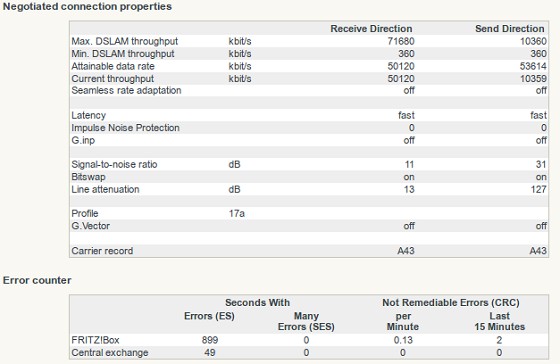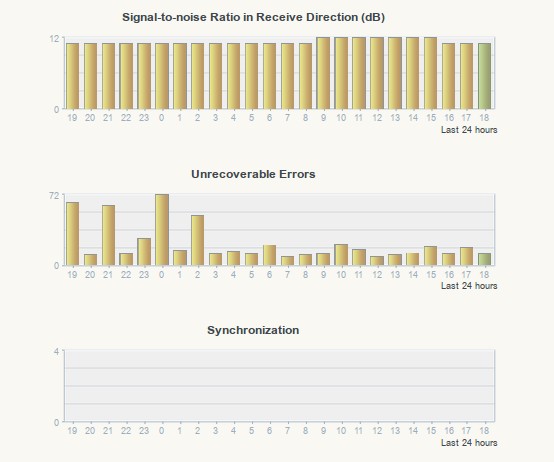|
|
|
hio77: mind posting your dsl stats too kentnl? i am curious.
Current data:



#include <std_disclaimer>
Any comments made are personal opinion and do not reflect directly on the position my current or past employers may have.
hio77:
this brings another question for Brent, has Seamless rate adaptation been implemented to chorus's network now?
fyi, realtime updates are in dating back to 5.22, and the max/min has been in since 5.51. just hasnt really been useful, until now if SRA has been enabled on chorus gear recently (which looking at your results, maybe it has..)
#include <std_disclaimer>
Any comments made are personal opinion and do not reflect directly on the position my current or past employers may have.
hio77: Ha, it's a pretty active thread indeed.
Didn't know bitswap actually altered synced speeds.
I didn't think so, but considering the graphs and a Vodafone guy I talk to often claiming he had it, was worth a second ask.
Guess it's just saving min and maxes a bit better now.
Min on the 5.22 was zero and max being current.
BMarquis:hio77: Ha, it's a pretty active thread indeed.
Didn't know bitswap actually altered synced speeds.
I didn't think so, but considering the graphs and a Vodafone guy I talk to often claiming he had it, was worth a second ask.
Guess it's just saving min and maxes a bit better now.
Min on the 5.22 was zero and max being current.
The spectrum graph is bits per tone. Bit swaps would alter the bits per tone as it takes/adds bits in/out of tones :)
Didn't look like the sync rate changed, but the graph with min/max didn't show bitrate
#include <std_disclaimer>
Any comments made are personal opinion and do not reflect directly on the position my current or past employers may have.
hio77:BMarquis:hio77: Ha, it's a pretty active thread indeed.
Didn't know bitswap actually altered synced speeds.
I didn't think so, but considering the graphs and a Vodafone guy I talk to often claiming he had it, was worth a second ask.
Guess it's just saving min and maxes a bit better now.
Min on the 5.22 was zero and max being current.
The spectrum graph is bits per tone. Bit swaps would alter the bits per tone as it takes/adds bits in/out of tones :)
Didn't look like the sync rate changed, but the graph with min/max didn't show bitrate
was more referring to the comment of his sync rate changing on the fly, which is the second point that made me look at it.
bitswap is one i have often wondered about, in terms of how much of a change it can actually make, ild speculate to assume that the reason CRC rates drop down after awhile is bitswap swapping out where the errors are occurring.
kentnl: I might have been imagining things. Watching it now and the only thing that moves lots is the Attainable upstream value ( the value that is well above the dslam upstream max ), and its drifting by a few hundred K per update.
But thats's probably extracted from the same data used to produce the spectrum graph, so it may simply be reporting the medium limits irrespective of the hardware at the end.
US Sync has been stable at 1-bps less than DSLAM max and DS sync is stable at DSLAM max.
So probably sense-confusion on my behalf making a bit of red herring.
#include <std_disclaimer>
Any comments made are personal opinion and do not reflect directly on the position my current or past employers may have.
hio77:
bitswap is one i have often wondered about, in terms of how much of a change it can actually make, ild speculate to assume that the reason CRC rates drop down after awhile is bitswap swapping out where the errors are occurring.
stevehodge:hio77:
bitswap is one i have often wondered about, in terms of how much of a change it can actually make, ild speculate to assume that the reason CRC rates drop down after awhile is bitswap swapping out where the errors are occurring.
That's my understanding of how it is supposed to work. It shouldn't affect the overall sync rate as bits are swapped from one tone to another. It should reduce errors by moving bits off of frequencies that are experiencing crosstalk or interference.
#include <std_disclaimer>
Any comments made are personal opinion and do not reflect directly on the position my current or past employers may have.

#include <std_disclaimer>
Any comments made are personal opinion and do not reflect directly on the position my current or past employers may have.
|
|
|
